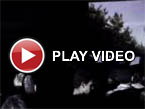Jetset
 Touted by just about every publication as being one of the next bestthings, The Stratford 4 leave a lot to be desired on this, their secondfull-length. Equally influenced it seems by My Bloody Valentine, TheCure, and scores of Brit-pop bands, their music is delayed anddistorted guitars with a pop sensibility. Officially, I would like tosay that this sound is going to take them absolutely nowhere unlessthey can improve the juvenile lyric-writing. The music is just fine,imploring pleasant melodies, grooving basslines, and lots of effectsthat make the guitars swirl and shriek behind them. Unfortunately, whatcomes to the forefront is just plain awful. "I went to confession but Ihad nothing to confess. They said what's wrong with you? You're usuallysuch a mess" is almost as bad as "If you want to kiss my mouth, tell mewhat it's all about, if you want to climb into bed with your delicatehead than that would be alright." This is a study in how to write likeDamon Albarn, with a great sense at times of what good music is, but nograsp whatsoever of poetry or prose. This music could stand a bit ofvariation, too, as it seems every song says what it's supposed to inthe first three minutes, then jams out a bit for the rest; or it jams abit in the beginning to build to the proper idea, then soars outtowards the end. The first song on the album, "Where the Ocean Meetsthe Eye," is the only one that shows promise in this sound, with quietbass joining chiming delayed guitars and slightly echoed drums. It allgets engulfed as the flames of loud angry distortion grow higher andhigher. The vocals join in at the height of the volume, and the lyricsare wailed in such a way that they aren't always recognizable. Perfect.Let the music talk and let the lyrics be puzzled over. If they'd donethat more, it probably wouldn't be so bad.
Touted by just about every publication as being one of the next bestthings, The Stratford 4 leave a lot to be desired on this, their secondfull-length. Equally influenced it seems by My Bloody Valentine, TheCure, and scores of Brit-pop bands, their music is delayed anddistorted guitars with a pop sensibility. Officially, I would like tosay that this sound is going to take them absolutely nowhere unlessthey can improve the juvenile lyric-writing. The music is just fine,imploring pleasant melodies, grooving basslines, and lots of effectsthat make the guitars swirl and shriek behind them. Unfortunately, whatcomes to the forefront is just plain awful. "I went to confession but Ihad nothing to confess. They said what's wrong with you? You're usuallysuch a mess" is almost as bad as "If you want to kiss my mouth, tell mewhat it's all about, if you want to climb into bed with your delicatehead than that would be alright." This is a study in how to write likeDamon Albarn, with a great sense at times of what good music is, but nograsp whatsoever of poetry or prose. This music could stand a bit ofvariation, too, as it seems every song says what it's supposed to inthe first three minutes, then jams out a bit for the rest; or it jams abit in the beginning to build to the proper idea, then soars outtowards the end. The first song on the album, "Where the Ocean Meetsthe Eye," is the only one that shows promise in this sound, with quietbass joining chiming delayed guitars and slightly echoed drums. It allgets engulfed as the flames of loud angry distortion grow higher andhigher. The vocals join in at the height of the volume, and the lyricsare wailed in such a way that they aren't always recognizable. Perfect.Let the music talk and let the lyrics be puzzled over. If they'd donethat more, it probably wouldn't be so bad.
 Touted by just about every publication as being one of the next bestthings, The Stratford 4 leave a lot to be desired on this, their secondfull-length. Equally influenced it seems by My Bloody Valentine, TheCure, and scores of Brit-pop bands, their music is delayed anddistorted guitars with a pop sensibility. Officially, I would like tosay that this sound is going to take them absolutely nowhere unlessthey can improve the juvenile lyric-writing. The music is just fine,imploring pleasant melodies, grooving basslines, and lots of effectsthat make the guitars swirl and shriek behind them. Unfortunately, whatcomes to the forefront is just plain awful. "I went to confession but Ihad nothing to confess. They said what's wrong with you? You're usuallysuch a mess" is almost as bad as "If you want to kiss my mouth, tell mewhat it's all about, if you want to climb into bed with your delicatehead than that would be alright." This is a study in how to write likeDamon Albarn, with a great sense at times of what good music is, but nograsp whatsoever of poetry or prose. This music could stand a bit ofvariation, too, as it seems every song says what it's supposed to inthe first three minutes, then jams out a bit for the rest; or it jams abit in the beginning to build to the proper idea, then soars outtowards the end. The first song on the album, "Where the Ocean Meetsthe Eye," is the only one that shows promise in this sound, with quietbass joining chiming delayed guitars and slightly echoed drums. It allgets engulfed as the flames of loud angry distortion grow higher andhigher. The vocals join in at the height of the volume, and the lyricsare wailed in such a way that they aren't always recognizable. Perfect.Let the music talk and let the lyrics be puzzled over. If they'd donethat more, it probably wouldn't be so bad.
Touted by just about every publication as being one of the next bestthings, The Stratford 4 leave a lot to be desired on this, their secondfull-length. Equally influenced it seems by My Bloody Valentine, TheCure, and scores of Brit-pop bands, their music is delayed anddistorted guitars with a pop sensibility. Officially, I would like tosay that this sound is going to take them absolutely nowhere unlessthey can improve the juvenile lyric-writing. The music is just fine,imploring pleasant melodies, grooving basslines, and lots of effectsthat make the guitars swirl and shriek behind them. Unfortunately, whatcomes to the forefront is just plain awful. "I went to confession but Ihad nothing to confess. They said what's wrong with you? You're usuallysuch a mess" is almost as bad as "If you want to kiss my mouth, tell mewhat it's all about, if you want to climb into bed with your delicatehead than that would be alright." This is a study in how to write likeDamon Albarn, with a great sense at times of what good music is, but nograsp whatsoever of poetry or prose. This music could stand a bit ofvariation, too, as it seems every song says what it's supposed to inthe first three minutes, then jams out a bit for the rest; or it jams abit in the beginning to build to the proper idea, then soars outtowards the end. The first song on the album, "Where the Ocean Meetsthe Eye," is the only one that shows promise in this sound, with quietbass joining chiming delayed guitars and slightly echoed drums. It allgets engulfed as the flames of loud angry distortion grow higher andhigher. The vocals join in at the height of the volume, and the lyricsare wailed in such a way that they aren't always recognizable. Perfect.Let the music talk and let the lyrics be puzzled over. If they'd donethat more, it probably wouldn't be so bad. 

 First issued in 2001 in a limited, card-packaged edition on the DutchBrombron label (a guise of Staalplaat, in collaboration with theNijmegen rehearsal space Extrapool), Heroin (reviewed in
First issued in 2001 in a limited, card-packaged edition on the DutchBrombron label (a guise of Staalplaat, in collaboration with theNijmegen rehearsal space Extrapool), Heroin (reviewed in  The alternative country sound seems to get no respect anymore, as itnever really achieved any of the goals it was going for. There arepublications dedicated to it, sure, and records come out all the timefor its stalwarts like Ryan Adams and the Jayhawks; but alt-country, asit is often called, never revolutionized country music, and its artistsare still not widely recognized by mainstream country. With theexception of bands like Nickel Creek doing a Stephen Malkmus song ontheir last album or Johnny Cash doing Soundgarden or Nine Inch Nails,it also seems to have lost some of its alternative edge. That's allabout to change with the arrival of Kathleen Edwards. For me, thepinnacle of the alt-country sound was Whiskeytown, the band Ryan Adamshad with Caitlin Cary until 2000. They had it all: beautiful harmonies,great hooks, and songs about booze and heartache. Edwards continuestheir sound on the first song on Failer,then promptly blows it the hell away. She even plays violin, like Carydid in Whiskeytown, adding a sadness or playfulness to certain songs,just to get the right feeling in the right place. Her sound is at onceclassic and new, her voice is assured and insecure, the songs perfectand uneven. She's also quite aware of the difficulties of selling hersound, as she states nicely in "One More Song the Radio Won't Like,"and on songs like "Six O'Clock News" and "Hockey Skates" you wonder whythe mainstream press won't just eat it up at the same time that youhope they won't. Even though there seems to be a preoccupation withbooze and bars in her music, they're not bad things for a country starto be singing about, though it seems there are more weaknesses Edwardscould be exploring. She hints at big ones in small mentions, aboutbabies coming in June, and how she can't seem to do anything right.Every time it comes right back to tipping a glass/bottle or, on onesong at least, getting high. Mostly, though, the whole album has a feelabout getting out. Maybe Edwards will break out with this record, but Ihope she doesn't lose sight of this desperation and sadness. It's worthmuch more even it means no one will hear it.
The alternative country sound seems to get no respect anymore, as itnever really achieved any of the goals it was going for. There arepublications dedicated to it, sure, and records come out all the timefor its stalwarts like Ryan Adams and the Jayhawks; but alt-country, asit is often called, never revolutionized country music, and its artistsare still not widely recognized by mainstream country. With theexception of bands like Nickel Creek doing a Stephen Malkmus song ontheir last album or Johnny Cash doing Soundgarden or Nine Inch Nails,it also seems to have lost some of its alternative edge. That's allabout to change with the arrival of Kathleen Edwards. For me, thepinnacle of the alt-country sound was Whiskeytown, the band Ryan Adamshad with Caitlin Cary until 2000. They had it all: beautiful harmonies,great hooks, and songs about booze and heartache. Edwards continuestheir sound on the first song on Failer,then promptly blows it the hell away. She even plays violin, like Carydid in Whiskeytown, adding a sadness or playfulness to certain songs,just to get the right feeling in the right place. Her sound is at onceclassic and new, her voice is assured and insecure, the songs perfectand uneven. She's also quite aware of the difficulties of selling hersound, as she states nicely in "One More Song the Radio Won't Like,"and on songs like "Six O'Clock News" and "Hockey Skates" you wonder whythe mainstream press won't just eat it up at the same time that youhope they won't. Even though there seems to be a preoccupation withbooze and bars in her music, they're not bad things for a country starto be singing about, though it seems there are more weaknesses Edwardscould be exploring. She hints at big ones in small mentions, aboutbabies coming in June, and how she can't seem to do anything right.Every time it comes right back to tipping a glass/bottle or, on onesong at least, getting high. Mostly, though, the whole album has a feelabout getting out. Maybe Edwards will break out with this record, but Ihope she doesn't lose sight of this desperation and sadness. It's worthmuch more even it means no one will hear it.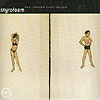 It's quite strange to imagine that there could now very well be ageneration of electronic-based musicians/artists who never sat forhours practicing scales, modes, chords, rhythms, what have you, on anactual instrument. Since the laptop revolution has brought aboutpractically every instrumental sound under the sun for consumption,there's not really a great need to sit with a chunk of wood or brass.Not that I don't favor electronic-based music or the musicians who makeit, but hearing additional sounds that were actually in the ether atsome point before being committed to tape (sorry, hard disk) makes fora refreshing change now and again. I'm What's There to Show That Something's Missing,the latest release from Belgian native Arne van Petegem (aka Styrofoam)enjoyably blends the glitch-type Powerbook beats and sounds with thelive element of prominent vocals and acoustic guitar at times for aninteresting take on modern pop music. "The Long Wait" opens the discwith the arpeggiations of said guitar and builds into a laid backgroove of electronic beats and keyboards that gradually thickens withsome synth bass while van Petegem's lush vocal layers deliver both acatchy melody and lyrics. The more pop-oriented "A Heart Without AMind" skips along to a wall of synth flourishes with the bass line andvocals leading the progressions until guitar and keyboards take over.The opening tape shuttle sounds of the more electronic "Forever, YouSaid Forever" drop out for some sparse keyboards and linear drummachine rhythms to provide the backing track for a sampled conversationof a couple that are in the midst of an arguement over a break-up. Thedisc's eight tunes are well crafted and arranged to highlight vanPetegem's skills as both a programmer and guitar player/vocalist byaugmenting the former with the latter. While this particular formulafor the laptop set is nothing new, Styrofoam's take on it makes for amore animated disc with the likeness of a full band.
It's quite strange to imagine that there could now very well be ageneration of electronic-based musicians/artists who never sat forhours practicing scales, modes, chords, rhythms, what have you, on anactual instrument. Since the laptop revolution has brought aboutpractically every instrumental sound under the sun for consumption,there's not really a great need to sit with a chunk of wood or brass.Not that I don't favor electronic-based music or the musicians who makeit, but hearing additional sounds that were actually in the ether atsome point before being committed to tape (sorry, hard disk) makes fora refreshing change now and again. I'm What's There to Show That Something's Missing,the latest release from Belgian native Arne van Petegem (aka Styrofoam)enjoyably blends the glitch-type Powerbook beats and sounds with thelive element of prominent vocals and acoustic guitar at times for aninteresting take on modern pop music. "The Long Wait" opens the discwith the arpeggiations of said guitar and builds into a laid backgroove of electronic beats and keyboards that gradually thickens withsome synth bass while van Petegem's lush vocal layers deliver both acatchy melody and lyrics. The more pop-oriented "A Heart Without AMind" skips along to a wall of synth flourishes with the bass line andvocals leading the progressions until guitar and keyboards take over.The opening tape shuttle sounds of the more electronic "Forever, YouSaid Forever" drop out for some sparse keyboards and linear drummachine rhythms to provide the backing track for a sampled conversationof a couple that are in the midst of an arguement over a break-up. Thedisc's eight tunes are well crafted and arranged to highlight vanPetegem's skills as both a programmer and guitar player/vocalist byaugmenting the former with the latter. While this particular formulafor the laptop set is nothing new, Styrofoam's take on it makes for amore animated disc with the likeness of a full band. There's a long list of albums with titles that are misnomers for the music inside. With Summer Sun,Yo La Tengo are pretty close to adding another to the list. Severaltracks interspersed save the album from this category by shining alittle light in, though the band generally gets mired in theirexquisitely somber sound, which is a very good thing. Album afteralbum, Yo La Tengo produce quality music with impressive productionvalues, and this album is no different. The proceedings start, as morethan one Yo La Tengo album has, with an instrumental of sorts, and"Beach Party Tonight" is a clear indication that the electronic side ispossessing the band more and more on each release. The whole albumfeatures more technology, and these additions lend a lot to the generalaura of the music without being intrusive. Ira Kaplan's vocals arefrequently hushed, as usual, and on "Beach Party," they're almostincomprehensible, bringing the music to the forefront. Georgia Hubleyis coming into her own vocally, sounding more and more like thechanteuse that's been hiding away. "Little Eyes" is a perfect power popproduction, much like the more mainstream fair of I Can Hear the Heart Beating as One.Elsewhere the tradition of one epic song per album continues, too, with"Let's Be Still" as this album's "Night Falls on Hoboken," and it's abit more coherent and a bit more freeform than before. One thing thatthe title suggests clearly, though, is that Yo La Tengo were out tohave a lot more fun this time, and it shows on tracks like "Georgia vs.Yo La Tengo," an almost '70s porn anthem laden with effects and funkpiano, and on "Winter A-Go-Go", which could almost pass for Steve andEydie. Even though there's more sun in the sky, there's always shadowscast, and that's what they thankfully couldn't avoid. Summer Sunis not their best work, but it is another solid album from a band notafraid to expand their sound, take chances or let loose every now andthen.
There's a long list of albums with titles that are misnomers for the music inside. With Summer Sun,Yo La Tengo are pretty close to adding another to the list. Severaltracks interspersed save the album from this category by shining alittle light in, though the band generally gets mired in theirexquisitely somber sound, which is a very good thing. Album afteralbum, Yo La Tengo produce quality music with impressive productionvalues, and this album is no different. The proceedings start, as morethan one Yo La Tengo album has, with an instrumental of sorts, and"Beach Party Tonight" is a clear indication that the electronic side ispossessing the band more and more on each release. The whole albumfeatures more technology, and these additions lend a lot to the generalaura of the music without being intrusive. Ira Kaplan's vocals arefrequently hushed, as usual, and on "Beach Party," they're almostincomprehensible, bringing the music to the forefront. Georgia Hubleyis coming into her own vocally, sounding more and more like thechanteuse that's been hiding away. "Little Eyes" is a perfect power popproduction, much like the more mainstream fair of I Can Hear the Heart Beating as One.Elsewhere the tradition of one epic song per album continues, too, with"Let's Be Still" as this album's "Night Falls on Hoboken," and it's abit more coherent and a bit more freeform than before. One thing thatthe title suggests clearly, though, is that Yo La Tengo were out tohave a lot more fun this time, and it shows on tracks like "Georgia vs.Yo La Tengo," an almost '70s porn anthem laden with effects and funkpiano, and on "Winter A-Go-Go", which could almost pass for Steve andEydie. Even though there's more sun in the sky, there's always shadowscast, and that's what they thankfully couldn't avoid. Summer Sunis not their best work, but it is another solid album from a band notafraid to expand their sound, take chances or let loose every now andthen.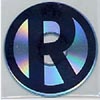 Replicator are a neat dynamic rock trio from the San Francisco Bay Area who get compared to Shellac a lot. This seems to be mostly because Shellac bassist Bob Weston records them and because they are quite vocal on the Shellac email list, which is how I happened to hear about them. To me a much better comparison would be Poster Children, but imagine how they might have ended up had they introduced the loops and synths of Salaryman into their exuberant rockpop shapes instead of separating into two different projects involving the same people.
Replicator are a neat dynamic rock trio from the San Francisco Bay Area who get compared to Shellac a lot. This seems to be mostly because Shellac bassist Bob Weston records them and because they are quite vocal on the Shellac email list, which is how I happened to hear about them. To me a much better comparison would be Poster Children, but imagine how they might have ended up had they introduced the loops and synths of Salaryman into their exuberant rockpop shapes instead of separating into two different projects involving the same people. Lately it seems Mark Eitzel has just been taking opportunities as they come. He was invited to record albums in Chicago and Athens, served a month long residency at the Knitting Factory in NYC and will soon tour Portugal and Spain. 'The Ugly American' is the result of the trip to Greece and the debut album from the UK's Tongue Master (a U.S. release date is likely for June or July via Thirsty Ear).
Lately it seems Mark Eitzel has just been taking opportunities as they come. He was invited to record albums in Chicago and Athens, served a month long residency at the Knitting Factory in NYC and will soon tour Portugal and Spain. 'The Ugly American' is the result of the trip to Greece and the debut album from the UK's Tongue Master (a U.S. release date is likely for June or July via Thirsty Ear).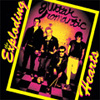 The Exploding Hearts are unabashed disciples of the vibrant,inescapably catchy power pop of bands like The Knack and The Nerves.Mixing the thrust of early punk with the melodic sensibilities ofsixties results in a spirited, irresistible product with a sharp edge.It's evident throughout Guitar Romantic that it isn't a pose, nor is it a joke. These are guys who are on their third or fourth copy of Singles Going Steadycause they wore them out, who wondered what Brian Wilson might havesounded like if he met up with Richard Hell, who know the value of agood, steady finger snap and aren't afraid to use it. This is the musicthey love and it is that passion that makes Guitar Romanticsuch an engaging listen. Don't think that because they pay homage to somany of their influences that there is nothing new on this record. Infact, the Exploding Hearts bring a ferocious energy to their sound,charging headfirst into a crunchy rocker, or soulfully crooning alongwith a backup harmony. "Modern Kicks" opens things up, digging rightin, and guaranteeing that you'll stick around for the rest of album.The lead guitar slices through the fuzzed out production that causesthe instruments to blur and rattle around each other. The mix gives adirty, vintage sound that adds to the personality of the music. Itsounds as if the album had slipped behind a shelf or under a pile ofrecords twenty years ago, only to be rediscovered today as a lost popgem. The bright shuffle of "Sleeping Aids and Razorblades" carries theHearts' soulful romantic persona with clever lyrics like "it's a littleupbeat / and it ain't in tune / you know it's just like this heart ofmine." That line could serve as the tagline for Guitar Romantic,as the Hearts cover the trials and troubles of teenage romance with theresiliently forlorn attitude they deserve, all packaged in a blissfullysweet pop delivery. "Jailbird," a love song about sniffing glue, has adevastatingly hooky chorus, amplified by the call and response backupvocals and a 120 watt guitar melody. You'll find yourself followingalong with every "Yeah, Yeah" and "Woah, Woah." There truly is not aweak song on the entire album. Each track is irresistibly catchy andafter a brief ten songs in twenty-eight minutes, the desire for anotherfix is intense. Guitar Romantic could have easily become justanother nostalgia act looking to knock off the past, but this is farfrom the case. They bring their own tack to a familiar style, imbuingit with a newfound youth and soul. The energy and vitality that theExploding Hearts put out is stunning, their music finely crafted topound even the most jaded music fan into grinning, head bouncingsubmission.
The Exploding Hearts are unabashed disciples of the vibrant,inescapably catchy power pop of bands like The Knack and The Nerves.Mixing the thrust of early punk with the melodic sensibilities ofsixties results in a spirited, irresistible product with a sharp edge.It's evident throughout Guitar Romantic that it isn't a pose, nor is it a joke. These are guys who are on their third or fourth copy of Singles Going Steadycause they wore them out, who wondered what Brian Wilson might havesounded like if he met up with Richard Hell, who know the value of agood, steady finger snap and aren't afraid to use it. This is the musicthey love and it is that passion that makes Guitar Romanticsuch an engaging listen. Don't think that because they pay homage to somany of their influences that there is nothing new on this record. Infact, the Exploding Hearts bring a ferocious energy to their sound,charging headfirst into a crunchy rocker, or soulfully crooning alongwith a backup harmony. "Modern Kicks" opens things up, digging rightin, and guaranteeing that you'll stick around for the rest of album.The lead guitar slices through the fuzzed out production that causesthe instruments to blur and rattle around each other. The mix gives adirty, vintage sound that adds to the personality of the music. Itsounds as if the album had slipped behind a shelf or under a pile ofrecords twenty years ago, only to be rediscovered today as a lost popgem. The bright shuffle of "Sleeping Aids and Razorblades" carries theHearts' soulful romantic persona with clever lyrics like "it's a littleupbeat / and it ain't in tune / you know it's just like this heart ofmine." That line could serve as the tagline for Guitar Romantic,as the Hearts cover the trials and troubles of teenage romance with theresiliently forlorn attitude they deserve, all packaged in a blissfullysweet pop delivery. "Jailbird," a love song about sniffing glue, has adevastatingly hooky chorus, amplified by the call and response backupvocals and a 120 watt guitar melody. You'll find yourself followingalong with every "Yeah, Yeah" and "Woah, Woah." There truly is not aweak song on the entire album. Each track is irresistibly catchy andafter a brief ten songs in twenty-eight minutes, the desire for anotherfix is intense. Guitar Romantic could have easily become justanother nostalgia act looking to knock off the past, but this is farfrom the case. They bring their own tack to a familiar style, imbuingit with a newfound youth and soul. The energy and vitality that theExploding Hearts put out is stunning, their music finely crafted topound even the most jaded music fan into grinning, head bouncingsubmission. 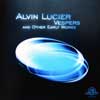 These five Lucier pieces dating from 1961 to 1970 provide handyillustrations of my love-hate relationship with American academicmusic. Its central Theory versus Music dialectic is interesting. Is thetheory on which music is based important? If so, to whom? If a CD makesno sense aesthetically or otherwise until the liner notes are read (andthe liner notes are in this elevated domain unquestionably important)what does that say about the music? Does the pleasure of listeningdepend on the theory or should the pleasure be sought in the theoryitself? The first illustration on this CD is "Vespers" (1969) whichinvolves performers moving around a given acoustic space withdirectional pulse generators. I liked the piece before I read the notesbut I find it makes even more interesting listening how that I have.The piece demonstrates the theory that humans perceive physical spacethrough our sense of hearing. Without the theory, it's fifteen minutesof attractive clicking sounds but with the theory the listener becomesconsciously involved by providing and operating the apparatus for theperceptual half of the experiment, which can lead to deeperunderstanding and pleasure—it's rather like having impressionistpainting explained to you for the first time. Implication: theory canenhance music. "Chambers" (1968) illustrates another point; beforereading my response was: sounds okay, nice enough. It involves variousrecordings of sound spaces, such as a railway station, cafeteria orwhat-have-you, playing on portable devices, disguised in some kind ofwrapping, that are placed within the performance sound space—thuschambers (i.e. acoustic spaces) within chambers. Now that's fine andperhaps even witty, in a rather twee academic way, but grasping theconcept doesn't improve the listening experience and I'm beginning toget annoyed by the suggestion that the concept is even relevant to me.Implication: theory doesn't always enhance music and can detract. Onyet another hand, "North American Time Capsule" (1967), a performanceon the archaic Sylvania encrypting voice encoder without thecorresponding decoder, is unlistenable with or without the various deepand interesting levels of meaning provided by its associated theory.Implication: theory cannot enhance bad music. "(Middletown) MemorySpace" (1970) is scripted thus: a number of singers and/orinstrumentalists go out into a city and "record, by anymeans—electronic recording, graphic notation, or memory—the sounds ofthe city," return and "re-create, solely my means of your voices andinstruments and with the aid of memory devices (without additions,deletions, improvisation, interpretation) those outside soundsituations." On this performance the music sounds like rather dullimprov. Contemplating the composition (i.e. the instructions) providesa better distraction than the music: can it be done?; does it matter atall if it can't?; is the absurd impossibility of the parenthetical"without" clause another joke?; is this what group improv sounds likewhen exerting personality and thus interaction is explicitlyforbidden?; what must it be like to be paid to think about thesethings? And there we have, I fear, the crucible of my irritation:jealousy. These Cagian exercises must surely be great fun for thecomposer and may even be pleasing for the performers but the disregardfor whether or not the music will be any good to listen to is a littleirksome to the mere audience member. The implication is that composingand being a composer is more important than being a listener, eventhough the former is existentially dependent on the latter (composingfor its own sake has little to do with music). Such elitism isjustifiable and I am thankful for it when the resulting art is good andvaluable. But when it is not, which is not the exceptional case inAmerican academic music, I find that I cannot discard it without envy.
These five Lucier pieces dating from 1961 to 1970 provide handyillustrations of my love-hate relationship with American academicmusic. Its central Theory versus Music dialectic is interesting. Is thetheory on which music is based important? If so, to whom? If a CD makesno sense aesthetically or otherwise until the liner notes are read (andthe liner notes are in this elevated domain unquestionably important)what does that say about the music? Does the pleasure of listeningdepend on the theory or should the pleasure be sought in the theoryitself? The first illustration on this CD is "Vespers" (1969) whichinvolves performers moving around a given acoustic space withdirectional pulse generators. I liked the piece before I read the notesbut I find it makes even more interesting listening how that I have.The piece demonstrates the theory that humans perceive physical spacethrough our sense of hearing. Without the theory, it's fifteen minutesof attractive clicking sounds but with the theory the listener becomesconsciously involved by providing and operating the apparatus for theperceptual half of the experiment, which can lead to deeperunderstanding and pleasure—it's rather like having impressionistpainting explained to you for the first time. Implication: theory canenhance music. "Chambers" (1968) illustrates another point; beforereading my response was: sounds okay, nice enough. It involves variousrecordings of sound spaces, such as a railway station, cafeteria orwhat-have-you, playing on portable devices, disguised in some kind ofwrapping, that are placed within the performance sound space—thuschambers (i.e. acoustic spaces) within chambers. Now that's fine andperhaps even witty, in a rather twee academic way, but grasping theconcept doesn't improve the listening experience and I'm beginning toget annoyed by the suggestion that the concept is even relevant to me.Implication: theory doesn't always enhance music and can detract. Onyet another hand, "North American Time Capsule" (1967), a performanceon the archaic Sylvania encrypting voice encoder without thecorresponding decoder, is unlistenable with or without the various deepand interesting levels of meaning provided by its associated theory.Implication: theory cannot enhance bad music. "(Middletown) MemorySpace" (1970) is scripted thus: a number of singers and/orinstrumentalists go out into a city and "record, by anymeans—electronic recording, graphic notation, or memory—the sounds ofthe city," return and "re-create, solely my means of your voices andinstruments and with the aid of memory devices (without additions,deletions, improvisation, interpretation) those outside soundsituations." On this performance the music sounds like rather dullimprov. Contemplating the composition (i.e. the instructions) providesa better distraction than the music: can it be done?; does it matter atall if it can't?; is the absurd impossibility of the parenthetical"without" clause another joke?; is this what group improv sounds likewhen exerting personality and thus interaction is explicitlyforbidden?; what must it be like to be paid to think about thesethings? And there we have, I fear, the crucible of my irritation:jealousy. These Cagian exercises must surely be great fun for thecomposer and may even be pleasing for the performers but the disregardfor whether or not the music will be any good to listen to is a littleirksome to the mere audience member. The implication is that composingand being a composer is more important than being a listener, eventhough the former is existentially dependent on the latter (composingfor its own sake has little to do with music). Such elitism isjustifiable and I am thankful for it when the resulting art is good andvaluable. But when it is not, which is not the exceptional case inAmerican academic music, I find that I cannot discard it without envy. 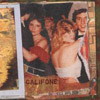 This is proof that a band can combine a number of different musicalgenres into an album and still have it be as beautiful as it isinteresting. Country and folk roots, good ol' fashioned rock, blues,and sound collages all fit together quite nicely and summon spiritsboth old and new with outstanding results. Califone's Quicksand/Cradlesnakesdoesn't have a single wasted note on it. Electric and acousticinstrumentation fit together like pieces of a musical puzzle few othershave been able to solve; tape loops of broken, stringed instruments,computer beeps and bloops, and spiraling machine noise slideeffortlessly into and alongside country-tinged ballads full oflamenting pianos and dancing guitars. A perfect example of this lovelycombination is "Horoscopic.Amputation.Honey.," where buzzing guitarsshift in and out of mix that includes wooden, rattling percussion, whatsounds like a type-writer, and twangy acoustic guitar. Tim Rutili'svoice plays a big part in the music, too. At times his voice is sweetand soft like a lullaby and elsewhere it is bold and full of attitude.The rebellious and edgey "Your Golden Ass" is full spicey vocals,surreal lyrics, grimy guitar, and steel drums that somehow fit in witheverything else. The primitive and nervous "(Red)" makes me feel likeI'm in the middle of an almost-deserted and very dangerous townsomewhere in a vast desert and "When Leon Spinx Moved Into Town" is asexy, albeit quiet, rock tune blossoming with southern spices and atension that is hard to identify, but is looming and menacing in a verysinister way. The entire album is lavished with images and emotionsthat leave no room for dull moments. Califone has given birth to onehell of a fine rock album; it is diverse, full of lovely songs, andjust plain fun to listen to.
This is proof that a band can combine a number of different musicalgenres into an album and still have it be as beautiful as it isinteresting. Country and folk roots, good ol' fashioned rock, blues,and sound collages all fit together quite nicely and summon spiritsboth old and new with outstanding results. Califone's Quicksand/Cradlesnakesdoesn't have a single wasted note on it. Electric and acousticinstrumentation fit together like pieces of a musical puzzle few othershave been able to solve; tape loops of broken, stringed instruments,computer beeps and bloops, and spiraling machine noise slideeffortlessly into and alongside country-tinged ballads full oflamenting pianos and dancing guitars. A perfect example of this lovelycombination is "Horoscopic.Amputation.Honey.," where buzzing guitarsshift in and out of mix that includes wooden, rattling percussion, whatsounds like a type-writer, and twangy acoustic guitar. Tim Rutili'svoice plays a big part in the music, too. At times his voice is sweetand soft like a lullaby and elsewhere it is bold and full of attitude.The rebellious and edgey "Your Golden Ass" is full spicey vocals,surreal lyrics, grimy guitar, and steel drums that somehow fit in witheverything else. The primitive and nervous "(Red)" makes me feel likeI'm in the middle of an almost-deserted and very dangerous townsomewhere in a vast desert and "When Leon Spinx Moved Into Town" is asexy, albeit quiet, rock tune blossoming with southern spices and atension that is hard to identify, but is looming and menacing in a verysinister way. The entire album is lavished with images and emotionsthat leave no room for dull moments. Califone has given birth to onehell of a fine rock album; it is diverse, full of lovely songs, andjust plain fun to listen to. 